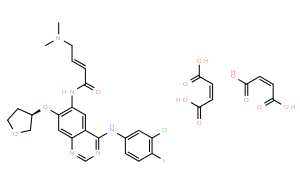| Description |
Afatinib (BIBW2992) Dimaleate irreversibly inhibits EGFR/HER2 including EGFR(wt), EGFR(L858R), EGFR(L858R/T790M) and HER2 with IC50 of 0.5 nM, 0.4 nM, 10 nM and 14 nM, respectively; 100-fold more active against Gefitinib-resistant L858R-T790M EGFR mutant.
|
|
Targets
|
| EGFR (L858R) [1] |
EGFR (wt) [1] |
EGFR (L858R/T790M) [1] |
HER2 [1] |
| 0.4 nM |
0.5 nM |
10 nM |
14 nM |
|
| In vitro |
BIBW2992 is more effective than erlotinib, gefitinib, or lapatinib in inhibiting survival of lung cancer cell lines harboring wild-type (H1666) or L858R/T790M (NCI-H1975) EGFR. BIBW2992 is similarly effective against NSCLC lines expressing HER2 776insV (NCI-H1781) or EGFR E746_A750del (HCC827), but shows no activity toward A549 cells, which express wild-type EGFR and HER2.[1] Afatinib enhances cytotoxicity of topotecan and mitoxantrone to SP cells, and increases the apoptosis induced by topotecan and mitoxantrone in SP cells.[2]
|
| In vivo |
In the MDA-MB-453 xenograft model, BIBW2992 (20 mg/kg, p.o.) results in dramatic tumor regression with a cumulative treated/control tumor volume ratio (T/C ratio) of 2%, and downregulation of EGFR and AKT phosphorylation.[1] In A7, A431, FaDu, UT-SCC-14 and UT-SCC-15 xenograft models, application of BIBW 2992 (30 mg/kg, p.o.) leads to a significant prolongation of tumour growth time.[3] In HER2-amplified xenograft medel, Afatinib (30 mg/kg, p.o.) results a markedly inhibition in tumor growth and a significant improvement in the duration of overall survival.[4] In HER2-positive gastric cancer NCI-N87 xenograft, afatinib (25 mg/kg, p.o.) leads to dramatic tumor volume regression within 4 d and near-complete tumor resolution after 21 d of treatment.[5]
|

 COA
COA MSDS
MSDS HPLC
HPLC NMR
NMR